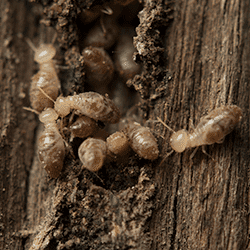When it comes to the potential threat of termites, it is easy to think it's no big deal. After all, when is the last time you saw a termite? But--just because you don't see termites doesn't mean you don't have termites. Signs of a termite colony can be difficult to see or not visible at all. And by the time you start seeing signs, termites have already had time to damage your property.
Termites have an important role in nature; they break down wood by feeding on cellulose. But termites can't tell the difference between a pile of dead wood in the forest and the wood of your home, so they commonly enter homes.
The queen and king of a termite colony work together to continually produce offspring. A queen is able to give birth to more than a million termites in a colony which is made up of workers, soldiers, and swarmers. Worker termites relentlessly search for food, soldiers protect the colony from predators, and swarmers take flight to establish new colonies.
There are only two ways to effectively protect a home from termites: Chemical or bait. A chemical treatment requires the injection of hundreds of gallons of termiticide into the soil all the way around a home with the goal of creating a complete barrier. But, to make a complete barrier, it is necessary to drill through concrete and brick and trench around the foundation wall. A bait solution is less intrusive. Discreet bait stations are strategically placed around the foundation perimeter. When termites come to feed, the bait immediately begins to use those termite workers against the colony that sent them, slowly passing from one termite to the next, all the way to the queen.
Another benefit to bait is that it gets better over time. The bait inside the stations becomes even more appetizing to termites as it ages. Chemicals, on the other hand, break down over time. Companies that offer chemical treatments will have to come back after 5-7 years and ask to do another booster treatment. Companies that offer bait will not.
Of the three types of termites in a colony, the worker termite is the most important to understand when it comes to choosing between chemical or bait termite protection. Since, termite workers continue to search for food, even after they've found a food source, they are almost guaranteed to find a hole through a chemical treatment barrier. Many things can obstruct a chemical barrier and termites only need 1/32 of an inch to get through. On the other hand, their relentless search for food ensures that they'll find the bait in the bait station. When they do, they share it with the other termites in their colony, and the colony dies.
What about price? Initial treatments are about the same for a chemical treatment and a bait station installation.
Whichever treatment option you choose for you, your home, and your family, be sure to choose a company that is QualityPro Certified by the National Pest Management Association, and one that has decades of experience. Don't trust your home to anything less.
 1426 Reviews
1426 Reviews


